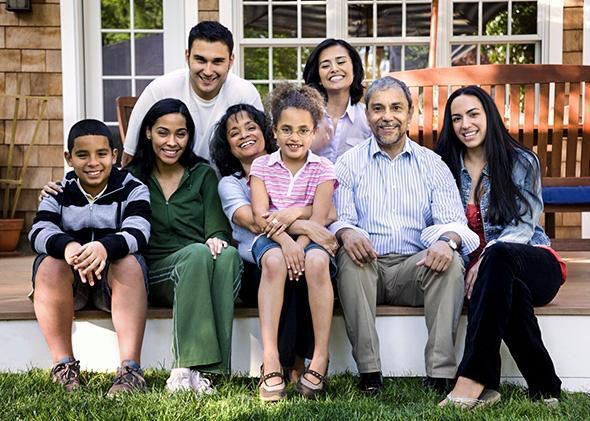Intergenerational Ministry in the Weird World of COVID-19

Looking back, the decision to cancel face-to-face services at our church was a no-brainer. During that Friday morning emergency meeting, however, our staff team felt the full weight of this decision. At that early stage of Canada’s COVID-19 crisis, we were hearing the news that older adults were especially at risk and that children might be “super-spreaders” (an assumption that has since been proven incorrect). Based upon the information we had at our disposal, we ultimately concluded that intergenerational ministry, bringing the generations of our church family together on Sunday, was simply too risky.
This was especially hard on me. One of my top priorities as a pastor has been to see our church grow as a vibrant community of faith in which people of all generations worship, serve, learn, and grow together. Now, as we entered the strange new world of COVID-19, so many of the ways in which our congregation had been learning to live into this intergenerational vision came to a screeching halt.
This pandemic has forced all of us as church leaders to ask questions we’ve never faced before. So, one might ask, is all this effort to bring the generations together even worth it? In a world that is being radically reshaped by our experience of COVID-19, is this even realistic anymore?
One basic theological truth that has gotten lots of attention on social media in recent months is that the church is more than its Sunday morning gathering. During this pandemic crisis, churches have been forced to find new ways of doing things. Yet they haven’t stopped being the church. The same rings true for this commitment to being an intergenerational community. In fact, I’d go so far as to say that I’m more convinced than ever that this is important.
Here are four ways that the world of COVID-19 has highlighted for me the importance of intergenerational ministry.
1. Caring across Generations
As soon as the COVID crisis began to gain momentum in Alberta, our staff was flooded with communications from church members desiring to help others. Many anticipated that seniors would be especially in need of assistance.
One small group composed mostly of twentysomething young adults emailed to express their desire to care for their elders: “…we would like to offer our hands, in whatever capacity they might be useful, to help meet the needs of our congregation during this time. Whether it’s doing grocery runs, picking up supplies, or just giving someone a phone call, we would love to help as best we can.”
At the same time, some young moms in our church have struggled with feeling overwhelmed at times during this COVID period. The disruption of the daily rhythms of family life caused by sheltering-in-place restrictions and the demands of school-from-home have added tremendous stress to their lives. I have been encouraged by stories of middle-aged women in the church reaching out to these moms to offer support, prayer, and assistance.
In reality, the church always benefits when the generations care for one another like this. It enables a congregation to foster a culture of care that is much harder to achieve when the generations keep to themselves.
2. Sharing Faith across Generations
Storytelling might seem like a trivial matter in the grand scheme of things. However, it is immensely important. Each of us is engaged in an ongoing process of narrating our own lives, interpreting our experiences, and trying to figure out what sort of story we find ourselves in. The COVID-19 period has thrust many Christians into wrestling with questions about what God is up to amid the circumstances of their lives (job loss, isolation, loss of loved ones, etc.).
This has made me especially grateful for the older adults of our church and the stories they bear. The stories of the profound trials many of them experienced as young adults in Poland in the years following WWII are mind-blowing. But these stories also are saturated with an awareness of God’s presence and faithfulness. As a congregation, we benefit from these stories of faith and the perspective they can offer us when we find ourselves immersed in seasons of disruption, crisis, and uncertainty.
This sharing of stories across generations—by both young and old—can be a vital resource within any community of faith. It provides a living expression of what David pictures in Psalm 145:4: “One generation commends your works to another…”
3. Serving across Generations
One of the exciting intergenerational initiatives that was birthed within our church in recent years is the Love Kitchen. Begun by a few Boomer-aged women, this ministry has brought people from various generations together each month to prepare healthy meals that are frozen and then made available to households in need.
Once the COVID crisis began, it wasn’t possible to continue these monthly kitchen sessions. Fortunately, these diligent servants had already prepared an impressive stockpile of frozen meals. On several occasions during this pandemic period, families in need have benefited from the efforts of this intergenerational group.
When people of different generations serve together through opportunities like the Love Kitchen, this enables them to develop rapport, to direct their shared energies beyond themselves toward helping others, and to grow together in a Christlike posture of servanthood.
It has been encouraging to see some of the new ways that this has gained expression during this COVID-19 period. For example, several of our intergenerational neighborhood groups have discovered opportunities to serve the community around them. I am eager to see how this commitment to serving together across the generations continues to take new form in the months ahead.
4. Bearing Witness Together as an Intergenerational Ministry
I admittedly have been surprised and troubled by some of the ageist messages that have surfaced on social media and the evening news during this COVID crisis. Some young people have been dismissive toward the risk their public behavior could have on the wellbeing of older adults. A few US politicians have even suggested that it was the patriotic duty of older adults to be willing to sacrifice themselves for the sake of the economy!
As Christians, we believe that people of all ages are made in God’s image and are of inherent worth. We belong to a community of faith in which people of all generations are learning to “value others above [our]selves, not looking to [our] own interests but…to the interests of the others” (Phil. 2:3-4).
While honoring and protecting one another across the generations often doesn’t look that impressive, it is actually pretty radical. The COVID-19 period has helped to emphasize how much this way of being the church departs from “the pattern of this world” (Romans 12:2). Simply by striving to live faithfully as an intergenerational community, the church signals something to the world about God’s true intentions for humanity.
I believe that caring, sharing, and serving together across the generations can continue to be a powerful facet of our prophetic witness, our “embodied apologetic,” within our communities.
Conclusion
It seems clear that it will be a while before we can come together as an intergenerational ministry and community in precisely the same ways we did before. Yet, I believe we can continue to find new opportunities to grow as a vibrant community of faith in which people of all generations worship, serve, learn, and grow together.
*****
Cory Seibel pastors at Central Baptist Church in Edmonton, Alberta. He earned his M.Th. degree through Spurgeon’s College, London, and a Ph.D. from the University of Pretoria. Cory frequently speaks on intergenerational ministry and has authored several papers and articles on this topic. He edited The Generative Church and the forthcoming volume, Engage All Generations, and contributed chapters to InterGenerate: Transforming Churches through Intergenerational Ministry.
*****
This article is reprinted courtesy of the Flourishing Congregations Institute. This article first appeared in the Flourishing Update – July 14, 2020: https://www.flourishingcongregations.org/post/flourishing-update-july-14-2020
Flourishing Congregations Website: https://www.flourishingcongregations.org
If you liked this article, learn more about intergenerational ministry through masterclasses and coaching.



